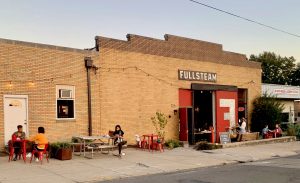
Fullsteam Brewery is the South’s first craft beer brewery with a mission to “craft distinctly Southern beer that celebrates the farm and food traditions of the American South” (Mission, n.d.). Since opening in 2010, Fullsteam pioneered the ‘Southern Beer Economy.’ Sean Lilly Wilson, Founder and Chief Executive ‘Optimist’, as he calls himself, broke down the meaning of the Southern Beer Economy into its three parts, each having equal weight and importance. According to Sean, Southern refers to re-connecting beer with the South’s rich farming history, Beer refers to their focus, as it’s the only product they make, and Economy means supporting local businesses and encouraging other breweries to follow their lead and embrace local ingredients (S. Wilson, personal communication. September 29, 2020). The Southern Beer Economy guarantees that money generated in a community stays in that community. The idea is to support local farmers and malthouses to thus encourage local growth and wealth in their own community with the intent that it will come full circle as the community purchases from and patronizes the brewery (E. Meyers, personal communication, September 29, 2020).
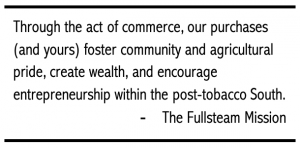
Fullsteam intentionally seeks out ingredients from local farmers, prioritizing minority-owned local businesses, like the three woman-owned farms that produce the basil for the Southern Basil Farmhouse Ale (Southern Basil, n.d.). Then, when the beer is on tap and ready to be sold, Fullsteam shares the percentage of the ingredients that came from the local community. They also create flavors that are complementary to the environment, reflecting what is in-season, to fulfill their mission to connect people to the land and to one another. Wilson explains, “we have an urban tavern, an urban brewery, but a desire to showcase foraged ingredients because as we know, a connection to the land is incredibly important for social and mental health and wellbeing” (S. Wilson, personal communication. September 29, 2020). For Fullsteam, beer can be the inflection point of where it all comes together, which is why they are passionate about what they do and why they are intentional about making their brewery a place for people of all backgrounds to come together.
As a place friends go to catch up or to celebrate, they recognize the importance of ensuring their community members are comfortable when at Fullsteam. They want their tavern to be a mirror of the community. That’s why Fullsteam doesn’t only live by their values, they vocalize them. With so much social unrest today, Wilson recognizes that companies in communities can no longer stand on the sidelines as community members are victims of injustice. How could Fullsteam be an accepted member of the community if they don’t do their part to help? For that reason, Fullsteam held off actively lobbying for tourism in the North Carolina State Legislature until the infamous
At Fullsteam, they recognize that not everyone understands the importance of their mission, and they hear the occasional comment that their beer is a “gimmick” (Fullsteam and the “Circular Economy”, 2020). But they are realistic about the dynamics of over 300 North Carolina breweries all trying to be known for something.
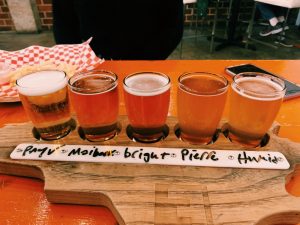
One of their biggest challenges is translating local into value for the average consumer. The harsh reality is the average beer drinker doesn’t care what percent local their beer is, as they are more interested in the style of beer and the brewery experience. Accordingly, teaching their customers that local is a value-add has become an internal passion project that they have fallen in love with (S. Wilson, personal communication. September 29, 2020). They are willing to spend more money on something that doesn’t influence the average experience if it means that they can continue to craft a Southern Beer Economy and encourage Southerners to reconnect with the land. The other challenge they face in light of their mission is that people don’t typically consider beer an agricultural product. Fullsteam is trying to reinvent beer’s image “from plow to pint”, inspiring agricultural pride and reconnecting consumers with North Carolina’s agricultural tradition. On their website, Wilson writes “numbers may drive our ability to do business, but they don’t drive our mission. The good earth — and good people — drive what we do” (Growing a Brewery, 2012).
When Fullsteam first opened, there were about 30 craft breweries in North Carolina – now there are over 300. When asked how this Southern Beer Economy works with “rival breweries” in the area, Wilson and Erik Myers, Director of Brewery Operations, were quick to mention that competition can be good for a community. They described the brewing industry in Durham as “co-opetition,” or competing for the common goal of strengthening the community. Ultimately, the Fullsteam staff takes great pride in being a member of their community. Sean explained that people were confused as to why they were opening in the location they did, but sure enough, their opening has helped create a new subsection of life in the community.
Individual Environmental Behavior
What motivates a brewery towards pro-environmental behavior? For Wilson and Myers, sustainability is an easy decision because it cuts costs and allows a small brewery like Fullsteam to grow.
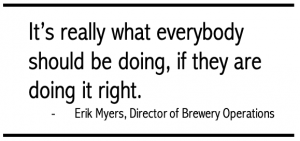 “Breweries are in and of themselves fairly sustainable just by their operations,” Myers said. “It makes sense to us.”
“Breweries are in and of themselves fairly sustainable just by their operations,” Myers said. “It makes sense to us.”
He explained Fullsteam’s practice of giving spent grain back to farmers to use as cattle feed. In this way, the brewery’s waste material goes back into the local economy, and, as an added bonus, they don’t have to pay to get rid of it.
Meet the honeybees. Robert Gifford introduces three types of environmental behavior in his article, “Dragons, mules, and honeybees: barriers, carriers, and unwitting enablers of climate change action.” The folks at Fullsteam are the honeybees, honorably working to increase sustainability to grow their “hive” (or in this case, their business and the local community it supports), but without necessarily claiming to be environmentalists (Gifford, 2013).
“We’ve improved ourselves on sustainability, but we don’t lead that as an anchor point in our discussion because I don’t want to get tripped up on that,” Wilson said. He said he would rather speak to what he knows – which is supporting the Southern Beer Economy through sourcing locally and returning grain back to the farmers.

Yet, Fullsteam runs on sustainable practices. They recycle as much water as possible in the fairly water-intensive process of brewing, switched to LED lights, improved insulation to cut heating and cooling expenditures, and host both recycling and composting programs. All ingredients, for both beer and the food program, are sourced from Southern farms, most of which are in North Carolina.
“The actions that we do that are above and beyond sustainably are really the things we should be doing as a brewery anyway,” Myers said. “And I think that’s one of the reasons that Sean says it’s hard for us to stand out as doing something extra: because it’s really what [breweries] should be doing.”
Take, for instance, Fullsteam’s choice to package their beer in aluminum cans. Aluminum is lighter and cheaper to transport than glass, which, as it chips and breaks, also tends to waste more product. Financially, aluminum is a better choice. Yet, it is also 100% recyclable and its lighter weight reduces the carbon footprint of shipping. Although these actions are in line with the honeybee strain of environmental behavior, Fullsteam collects all aluminum waste on-site and returns it directly to a recycler. This is a behavior that doesn’t necessarily increase their bottom line. And it isn’t an excuse for limited behavior, either. Wilson, in fact, said he is in awe of larger breweries that have the capital to invest more in sustainable management. He said it is one of the challenges of being a small brewery, but, he said, “we do what we can.”
How does Fullsteam encourage pro-environmental behavior in the community? Well, that one is easy:
“The most sustainable packaging is a keg on draft on-site,” Wilson said. “That’s why we’re big fans of visiting your local brewery, wherever you may be.”
Social Capital
Fullsteam Brewery utilizes social capital to ensure their goals of developing a Southern Beer Economy come to life. Social capital is defined as the social bonds of trust, reciprocity, and exchange between individuals and groups (Pretty and Smith, 2003). Fullsteam strives to create an inclusive environment where people of all backgrounds, races, sexual orientation, and ability feel welcome, a place where people can build social capital. Through social bonds of trust with local farmers and reciprocity and exchange with other breweries in the area, Fullsteam has been able to foster a community of breweries with similar aspirations. Despite the increase in the number of breweries driving further capital intensive competition, being part of this community and providing a place for community gatherings has been a mutual goal that Fullsteam and the other breweries can strive toward together.
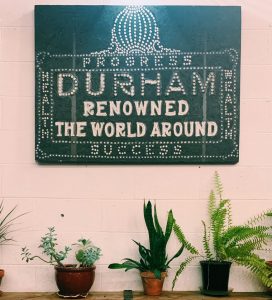
Wilson emphasized the importance of creating an intentional and progressive community center. When North Carolina reached the settlement on the Bathroom Bill, Fullsteam ensured that its brewery was inclusive and welcoming to people of all sexual orientations and identities, especially individuals who identify as LGBTQ and BIPOC. Fullsteam has also been intentional about amplifying Black voices and supporting the Black Lives Matter movement. The leadership at Fullsteam wishes it to be a setting that truly expresses the diversity of the community.
Fullsteam’s mission is only possible due to the powerful relationships that have been fostered with local malt houses and farms. The malthouses are run by friends and timely cultivated relationships have been formed with farmers who live within the ‘local’ radius. Wilson has found that commerce has acted as a great equalizer, creating opportunities to foster trust between growers and brewers with set expectations. Since Fullsteam is known for their commitment to the local market, a commitment that is more of a passion project than a fiscal incentive, farmers trust working with them.
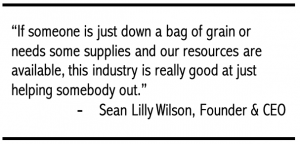
Dynamic cooperation has developed within the collegial brewery industry, specifically in the Greater Durham-Raleigh-Chapel Hill Triangle area. With healthy competition, comradery and mutual respect is fostered amongst the breweries. Although sometimes protective over key vendors, the leadership at Fullsteam admitted that with a trusted confidant, through reciprocity, they would be willing to share contacts and local ingredients.
The fact is that most breweries, although all making beer, are not making the same product so if resources are finite and someone else is in need of supplies, members of the industry support each other (S. Wilson, personal communication. September 29, 2020). As in any industry, there are collaborators and there are takers, especially in a very competitive industry like local breweries, yet social capital has allowed Fullsteam to embrace the Southern Beer Economy and inspire the community to follow suit.
The Three-Legged Stool of Sustainability
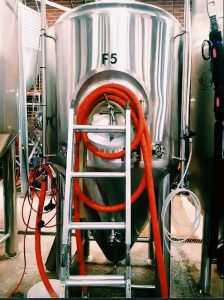
Fullsteam’s methods embody multi-dimensional sustainability, or what some call the “triple-bottom-line” or “three-legged stool” approach to sustainability. For those unfamiliar to the concept, this hypothetical “three-legged stool” balances the three tenants of sustainable development, which are focused on maximizing environmental, social, and economic wellbeing (Waas et al., 2011). If one of these priorities falls behind, or if another is overemphasized in a project or business, these “legs” can become wobbly and the stool will ultimately break. Although challenging for a comparatively small business, Fullsteam strives to keep their operations sustainable through all three of these lenses.
Much of this revolves around their efforts to promote a Southern Beer Economy. As mentioned, this entails relying on local farmers and malthouses for as many of their brewing inputs as possible. By doing so, Fullsteam supports job growth and personal income for local agriculture operations, which are key measures of economic success relating to sustainability according to Slaper (Slaper, 2013). As Wilson stated, they were one of the first regional or Southern breweries to focus on purchasing inputs locally, and other breweries in the area have followed suit. The fact that other breweries have followed Fullsteam’s trend of sourcing locally has helped maximize the economic sustainability of local agriculture. (S. Wilson, personal communication. September 29, 2020).
Socially, this has allowed the brewery to build trust and relationships with local farmers and producers. To reiterate, Fullsteam focuses on paying a fair price to all its suppliers and has worked with many of the same individuals and farms since beginning its operations. Supporting local farmers, moreover, allows them to invest in the security of fresh food supply networks and the wellbeing of residents in the Durham community at large. Even though Wilson concedes that consumers in the brewery are not always aware of the local impact of the brewery’s operations, he and employees stay true to their commitment to Durham and communities in the Southeast because they believe in social sustainability when conducting business (S. Wilson, personal communication. September 29, 2020).
Although Fullsteam does not have the size and capacity to invest directly in environmental considerations, this aspect of sustainability is baked into many of the business’s daily operations. As stated, they focus heavily on reducing and recycling any brewery waste, upgrading their facility’s energy efficiency, and reusing excess water through cooling and cleaning processes. Wilson’s suggestion to drink beer on draft at your local bar or brewery also lessens the impact of emissions related to packaging and transportation of beer products (S. Wilson, personal communication. September 29, 2020).
Fullsteam’s website reminds readers that “at the end of the day, it’s all about beer” and they “aim to keep it fun” (“Mission”, n.d.). They deserve credit, however, for providing this fun in a manner that supports the local economy, empowers Durham’s social community, and thoughtfully addresses the world environment.
References
Gifford, Robert. (2013). Dragons, mules, and honeybees: Barriers, carriers, and unwitting enablers of climate change action. Bulletin of the Atomic Sciences, 69(4), 41-48. http://bos.sagepub.com/content/69/4/41.
Juneteenth. (n.d.). Fullsteam Brewery. https://www.fullsteam.ag/beer/juneteenth
Mission: From Plow to Pint. (n.d.) Fullsteam Brewery. https://www.fullsteam.ag/mission
Myers, E., personal communication, September 29, 2020.
Pretty & Smith (2003) Social Capital in Biodiversity Conservation and Management, Conservation Biology, 631-638, Vol. 18, No 3.
Slaper, Timothy F. (2013). The Triple Bottom Line: What Is It and How Does It Work? Indiana University. http://www.ibrc.indiana.edu/ibr/2011/spring/article2.html
Southern Basil. (n.d.) Fullsteam Brewery. https://www.fullsteam.ag/beer/southern-basil
Waas, Tom et al. (2011). Sustainable Development: A Bird’s Eye View. Sustainability, 3, pp. 1637-1661. https://www.mdpi.com/journal/sustainability
Wilson, S. (2020, June 01). From Fullsteam’s Founder and CEO. Fullsteam Brewery. https://www.fullsteam.ag/journal/from-fullsteams-founder-and-ceo
Wilson, S. (2019, Sept 17). Fullsteam and the “Circular Economy”. Fullsteam Brewery. https://www.fullsteam.ag/journal/fullsteam-and-the-circular-economy
Wilson. S (2012, May 01). Growing a Brewery. Fullsteam Brewery. https://www.fullsteam.ag/journal/growing
Wilson, S., personal communication, September 29, 2020.